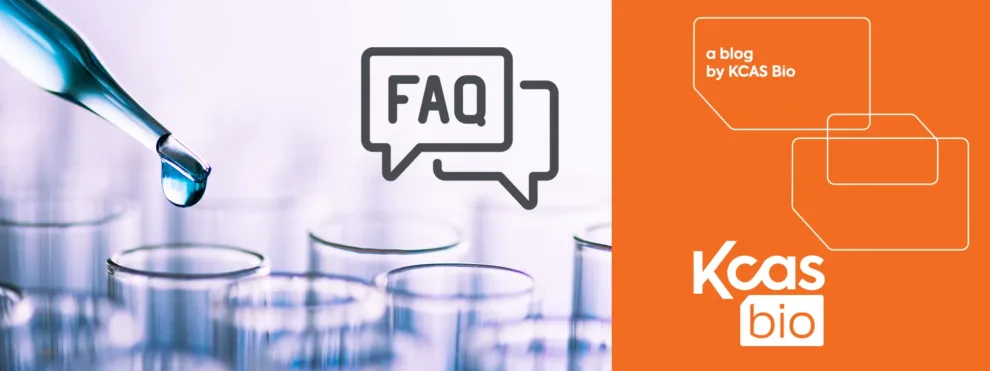Dose Formulation Analysis (DFA) is a critical component in regulated nonclinical studies, ensuring accurate dosing and supporting toxicokinetic assessments. At KCAS Bio, we specialize in providing comprehensive DFA services. Below are the top frequently asked questions about Dose Formulation Analysis and our services:
1. What is Dose Formulation Analysis, and why is it important?
Dose Formulation Analysis involves verifying the concentrations of dosing formulations used in preclinical toxicology studies. It ensures that the correct doses are administered, which is essential for accurate toxicokinetic assessments and regulatory submissions.
2. What types of formulations can KCAS Bio analyze?
KCAS Bio has experience with all types of formulations, including solid oral, semisolid, liquid, and medicated feeds. We are skilled in analyzing dose form suspensions, solutions, capsules, and feed.
3. How does KCAS Bio ensure the accuracy of dose formulations?
Our scientific experts develop and validate analytical methods tailored to your study requirements. We perform formulation analysis, concentration verification, homogeneity testing, and assess stability and purity at study concentrations.
4. What regulatory guidelines does KCAS Bio follow for DFA?
We comply with the US Food and Drug Administration (FDA) Good Laboratory Practice (GLP), as accepted by regulatory authorities such as the Organization for Economic Cooperation and Development (OECD) and the Japanese Ministry of Health, Labor and Welfare (MHLW).
5. Can KCAS Bio perform homogeneity and stability studies?
Absolutely. We conduct homogeneity, compatibility, and in-use stability studies to ensure the consistency and reliability of your formulations.
6. How does KCAS Bio handle formulation stability studies?
We perform GLP formulation stability studies in parallel with dose formulation studies, covering each test method across all dose form studies. We assess the longest storage time across studies and all formulation storage/shipping temperatures.
7. What is the process for developing and validating analytical methods for DFA?
Developing and validating analytical methods involves several critical steps:
- Method Development: Identifying optimal parameters for separating, detecting, and quantifying the drug within the formulation matrix.
- Method Validation: Establish linearity, accuracy, precision, specificity, limit of quantitation, diluted sample stability and room temperature-to-frozen condition evaluations to ensure reliable performance during sample analysis.
8. What analytical techniques does KCAS Bio utilize for DFA?
We employ various analytical techniques, including UHPLC-UV, UHPLC-FLD, LC-MS/MS, UV/Vis spectrophotometry, and NanoDrop to quantitatively analyze formulations.
9. Can Certificates of Analysis (COA) be provided for Active Pharmaceutical Ingredients (API)?
Yes, GLP-compliant Certificates of Analysis can be generated for APIs, metabolites, or internal standards. These certificates include analyses such as HPLC purity, endotoxin testing, pH, appearance, UV protein content and mass confirmation, which are essential for ensuring the quality and integrity of the substances used in GLP studies.
10. Does KCAS Bio offer method development with limited API during the CMC stage?
Yes, we offer method development with limited Active Pharmaceutical Ingredient (API) during the Chemistry, Manufacturing, and Controls (CMC) stage.
11. What sets KCAS Bio apart in Dose Formulation Analysis services?
Our key differentiators include fast method transfer, development, and GLP validation; professional eCTD FDA-ready GLP study reports; single-contact project management; and a state-of-the-art 70,000 sq ft analytical laboratory.
12. How does KCAS Bio support clients in interpreting DFA results?
Beyond providing analytical data, KCAS Bio offers comprehensive support in interpreting DFA results. Our experts collaborate with clients to contextualize findings, assess implications for formulation development, and guide subsequent steps in the drug development process.
13. Can KCAS Bio assist with troubleshooting formulation issues identified during DFA?
Yes, KCAS Bio offers consultative services to address and troubleshoot formulation issues uncovered during DFA. Leveraging our extensive experience, we provide recommendations for formulation optimization, method adjustments, and strategies to properly assess formulation stability and homogeneity.
Dose Formulation Analysis (DFA) plays a vital role in regulated nonclinical studies by ensuring precise dosing and supporting robust toxicokinetic data. KCAS Bio provides comprehensive DFA services—from method development and validation to homogeneity and stability testing—adhering to global regulatory standards.
Ready to ensure your dose formulations meet the highest standards? Contact KCAS Bio today to learn how our experts can support your studies with precision and confidence.

